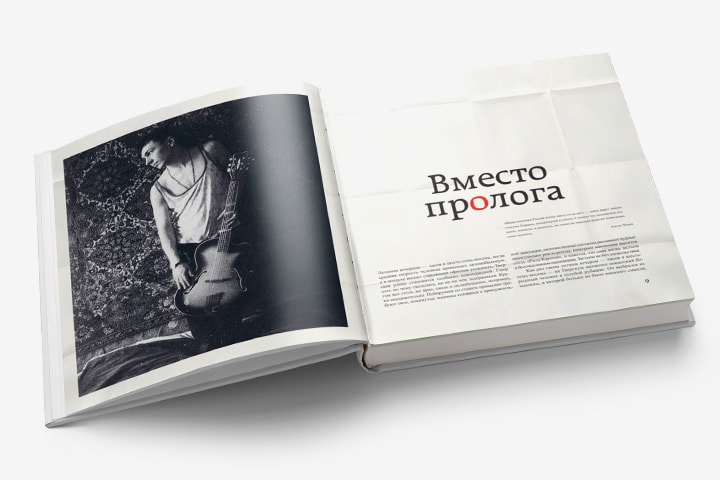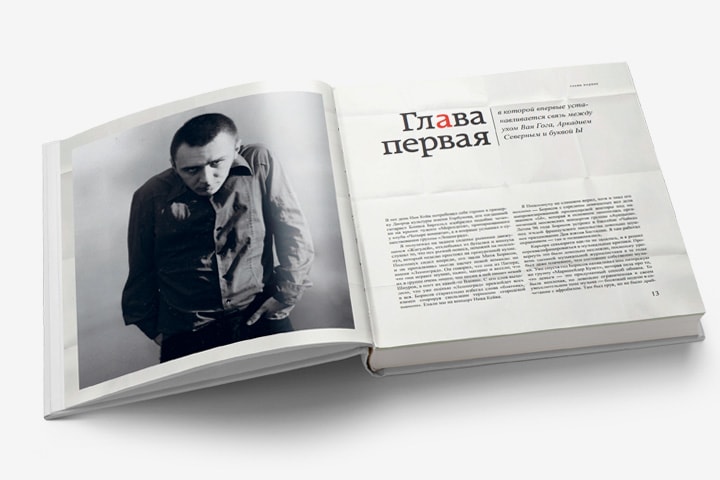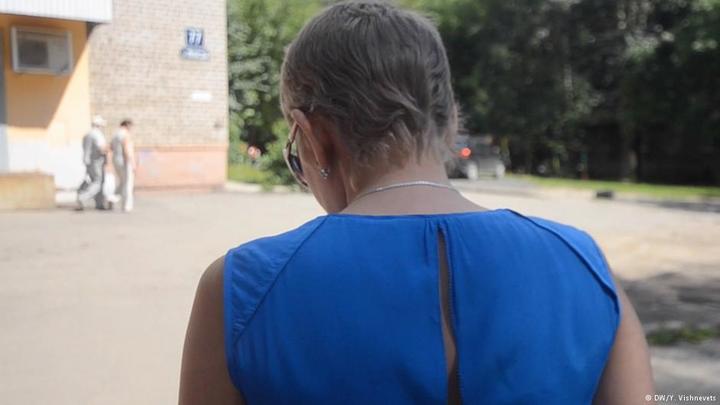Worse than AIDS: people who deny HIV infection. Read first: “Leningrad
An excerpt from the incredible and true story of the group (18+)
We are publishing an excerpt from the book, in which the writer and journalist, friend of Sergei Shnurov, Maxim Semelak tells the story of the legendary musical group.
“Leningrad” works with such vibrations that, in principle, are designed for a certain omnivorousness - its abuse is initially area-based, it is a sweepstakes group. Turning "Leningrad" into some kind of Russian search engine, Shnurov has accepted the need to respond to requests, which is why at concerts he insists so much on all this orchestrated applause, sing-alongs, bows and lights in the hall (lately it has gotten to the point where he forces the audience to first sit down and then jump up sharply in the process performance of the old song “Supergood”). The success of “Leningrad” is, strictly speaking, not praise or appreciation for it, it is rather an innate property, without it these songs simply lose their meaning, they were written for exactly this purpose. That’s why they usually listen to them for a long time and a lot, to the point of nausea. In the Russian concert space, “Leningrad” has gained a functional advantage, intertwining the features of a traveling circus, stadium rock and pleasure ship disco. The energy of “Leningrad” is based on completely fossil fuel - the group’s concerts are extremely archaic, everything is driven by a drive of purely animal origin, but of an ambiguous nature, corresponding to Shrunov’s motto “it’s good that everything is bad.”
His growing need for solitude and his search for light pushed him south. His temperament or feverish enthusiasm breaks down with Slavic melancholy, the doubt that his tail and the intense reflection that animates him transform his life into a realm of inviolability. In Dubourg, he admits his "need to break everything when the machine seems too round." This is because it fears mastery, which is the end of invention, and therefore needs constant renewal, the dizziness of risk, the leap into the unknown.

Leningrad LLC rests on three principles - wit, stupefaction, social science. “Leningrad” is funny, wild and precise - the combination of these qualities makes it practically invulnerable to criticism: it is difficult to approach it with serious standards, and at the same time, it is impossible to make fun of it, because the group itself will do it for you. In the songs of "Leningrad" you can hear a lot of things, from rude to stupid, but there is no dirt and complacency in it. “Leningrad” is, again, the Venedikterofey sphinx, its riddles, as was said, with pig overtones, but on the whole it works rather according to Herzen’s formula - “debauchery in Russia is not deep at all, it is more wild and greasy, noisy and , rude, disheveled and shameless than deep.” Everything is so, and the meaning of “Leningrad” is in the mood they once tamed and still retain, which Shnurov himself calls eschatological delight. As Mamardashvili, whom Shnurov valued, said, “What worries me most is the lack of tragic joy.”
It is necessary to work without know-how, to create out of disharmony, combining in the same dynamics a part of chance and inconsistency. A constant imbalance that gives the work a strange aura, an almost epidermal vibration and a veil of mystery that makes good paintings, they say: We can say that we do not know where he is going, or where he is coming. The inner movements of the soul, fighting against her poisons, her letters translate them, without overshadowing anything from the family dramas generated by the need to live far from her own, to the impossible love for Jeanne Polge. What a girl, he writes to Shar, the earth trembles with emotion, what rhythm is unique in the sovereign order.
“Leningrad” privatized the very feeling of the holiday, this is its trademark, whose shares are rising - the fewer reasons for celebration, the more relevant the Leningrad Institute. This paganalia is consistent with Russian literary traditions - it is a celebration of a generally small person (which is most clearly captured in the video “Drinking in St. Petersburg”). Shnurov was accused of mocking people, although he transformed the inertia of the usual local self-criticism into the energy of jubilation; and his notorious Louboutins also, funny as it may seem, came out of Gogol’s overcoat. In Mamleev's old story this is called - playing around in squalor.
She will be her model and her lover, but eventually she will break. “It’s not easy to remake life alone, facing the sea,” he admitted to a friend who played intermediary between Jeanne and him. So to try to get out of hell, he works like crazy, as Artaud said in Van Gogh, the suicide of society: No one has ever written or written, carved, invented, just to get out of hell. In vain. After a final trip to Paris to hear concerts by Schoenberg and Webern, he returns to Antibes before killing what would strangle and suffocate him by throwing himself into the void on the night of 16–17 March.

In Moscow, on a stretch near the Fili station, graffiti once appeared - a huge word FUCK, in which clouds, sky, forest, people were written in detail. This is Leningrad. Shnurov contained within himself this enveloping energy of barbarism, but in the same way as Lyn Khejinyan wrote about barbarism: “The figure of the barbarian poet I propose in no way implies romantic complacency. I do not intend to resuscitate or re-appeal the image of the pampered, self-indulgent, anti-intellectual pompous persona in the spirit of romantic clichés. In fact, the barbarian is a completely “ordinary” person creating a “new picture”. It is not a marginal language, but an agent (and conductor) of tangibility, as well as a medium of self-multiplying connections. It is the logic of these new connections that gives poetry its endless flexibility and ability to transform.” Shnurov turned into an agent of tangibility, and it was the logic of new connections that led to the fact that 2016 became the year of “Leningrad” - many groups here broke up and gathered again, but no one managed to return and rise to a higher level. Of course, there is a great temptation to assume that Shnurov is, as it were, Putin - well, since the Medvedev era coincided with the “Ruble”, and when Putin returned, “Leningrad” returned (although Shnurov met Medvedev, but not Putin). Although, after Trump’s incident, they began to see in “Leningrad” a global biopolitical tendency towards simplification and the aforementioned barbarism, and some person on Instagram compared him to the young Hitler (really a little similar). Shnurov himself explained all the speculation by saying that “Leningrad” had become an epic - with wide space for staging: “You cannot be successful, because Putin is successful, and these 86 percent do not give them rest - if you are successful, then you are playing on Putin’s aside, it's automatic. Although they themselves understand perfectly well that Shuvalov and I are not of the same breed, that we grew up here and exist not thanks to, but in spite of, and complaints against us arise equally from Orthodox activists and systemic liberals. But discussing us is the same as presenting the Australian band AC/DC with something about the Aborigines.”
Nicolas de Staël, in search of the absolute. For him to draw, there was an inner experience, a body-body with substance and light. The tension, raised to its height, as his letters show, has today gathered in large volume. According to the art historian André Chastel, to read the letters of Nicholas de Staël is to discover the man and the artist "in a pure state, without the envelope of admiring or hostile legend" that surrounded him. We know Vincent van Gogh's letters to his brother Theo, a poignant self-portrait of a hallucinated creator. described by Antonin Artaud as "the suicide of society".
Once, leaving the Moscow station, I noticed three mugs in a kiosk - Putin, Vysotsky, Shnurov. It seemed that other people were no longer depicted on the mugs. Shnurov, however, rather followed Utesov’s line - everything is fine, a beautiful marquise. There is such a term - “conservation status: causing least concern”. This is what they say about wolves, for example. On the one hand, this, of course, is about “Leningrad” - I don’t really believe that it will be possible to cope with it in a censorship-repressive manner; today it is really a big and seasoned beast. According to Yandex polls, the main memes of 2016 were “Louboutins” and “drink in St. Petersburg.” One night we sat at the Probka restaurant in the Gazprom building, where, as you know, the lights are turned off at one in the morning. We sat for two hours by candlelight - Andromedych sat down at the phono, Florida sang about boobs, then Shnurov got tired of it, at three o'clock in the morning he called the general director of Gazprom A. Dyukov, and the lights were turned on. It seems that it is difficult for Leningrad to get into the distribution, since it itself is traditionally on the distribution. However, like any newsman and individual worker who came from nowhere, he walks a strange fine line - both the authorities and the people seem to love him, but within the framework of the existing logic of the absurd - when there is a law on swearing and posters of “Leningrad “- no one ever guaranteed him anything, and he never had and doesn’t have any formal patrons. When the law was adopted, just three days later “Leningrad” performed at Urgant with a fresh song about the fiasco and an unnamed intercourse, and that same week an extremely closed corporate event took place at the Mikhailovsky Theater for very powerful mandarins, where Shnurov at the end of the curtain wished the audience: “Love and good luck, we’ll steal the rest!”
He, too, was a diligent letter writer, punctuating the gestures of his life with messages to his relatives, his friends, his relationships in the art world. What will improve our approach to the tormented personality of the one who embodies highest degree explosive and dazzling in art. The end point of a hopeless love that tied him to Jeanne Polge, her favorite model, muse, inspiring her with her most delicate and moving nudes. Tall, his face weary, his gaze piercing, Stahl looked a little like the albatross of Baudelaire's poem.
Immediately served and served his physical, strong and slightly uncomfortable, beautiful and vulnerable, dedicated to exaltation and internal battle. The correspondence, which we can fully accept today, emphasizes the aggravated character profile, his tousled romanticism. Art as a seismograph of the fluttering creature, this Stael puppet, has moved from abstraction to a refined pattern, maintaining the tense dynamics of its geometric flat areas. When he paints Jeanne, leaning back from all the sharpness of her eyes, she must give so much nakedness the multiple radiance of ocher, orange tones and the most mesmerizing marinas.

On the other hand, its snowball gradually gained mass - public organization The “Orthodox Union” called on people not to swear at concerts in Rostov-on-Don and Krasnodar, Novosibirsk activists wrote a denunciation to prosecutor Yuri Chaika, at the end of November someone called the police three times because of swearing on stage, Shnurov was fined several times. In the fall of 2016, he was overwhelmed by filming on Channel One - he took up hosting a talk show, citing reasons of creative safety - no one canceled parliamentary requests, and it would be more difficult for someone from Channel One to close a concert. In addition, “Leningrad” undertook to shoot its most pompous video for the song “Kolshchik” for 25 million rubles, with director Ilya Nightshuller, and also appeared in the fourth season of “Fizruk” - the most notable serial story of our time. Stas Rostotsky described it this way: “The Leningrad group arrived on the set with a truncated lineup - and in absolutely blissful ignorance of what they actually fit into: at that moment, the members of the group were most occupied with the new Metallica album and a couple of fresh compositions by Alla Pugacheva, analyzed by Shnur quickly, biasedly and philologically impeccably (he was especially upset by the rhymes). As in “Election Day,” “Leningrad” had to perform from the screen not its own song, but another stylization of itself, this time with the striking refrain “We need a match, everything has gone to HIV.” And suddenly they looked at each other, took the instruments and began to play House of Rising Sun. Their “House of the Rising Sun” made an absolutely stunning and magical impression - even despite the buffoonish “Give me some money!” barked by the Cord on the final chords.”
When he captures the sky at Honfleur or the saturated sun panoramas of Agrigento, he must radiate the light of the canvas itself. On the one hand, with large or narrow spots, it celebrates the wedding of sea and sky. On the other hand, it speaks of the splendor, but also of the destruction of the landscape by the heat of summer. But, besides the splendor, the purity of the colors, exalted by the “certain enamel of the dough,” melts away waves of uneasiness. Stael's beauty, irresistible and contagious, is not as calm as it seems. Behind the splendor lies melancholy, terrible loneliness.
Beyond the peaks of exaltation, vertigo threatens to confront the reality of a world that evades. On the one hand, we see a loving father, a caring husband. On the other hand, a person feels an artist in love with the ideal and absolute, burning with passion for Jeanne, the sublime muse who irrigates her creative life, but whose love, despite cruelty and reciprocity, remains complex. Strike the impregnation of loneliness in the Agrigento series. Hands, walls and captive stones of their mass seem inaccessible. An alarming mirror of an empty and scary world in the form of clear, green, orange or black horizons that hang over everything.
Before the next Leningrad concerts at the Barvikha Luxury Village, Shnurov and I went to wander around the shops, which are uninhabited in these parts, like some kind of cabinet of curiosities of consumerism. The local Prada boutique is reminiscent of the Texas installation Prada Marfa, which actually depicts a retail store in the middle of the desert. That evening it got colder, Shnurov wandered around the store, like that same dashing man in the icy desert, the saleswomen silently followed him. In the end, he chose an astrakhan fur coat for himself: “The real end of the empire!” They asked one and a half million for the fur coat. The test purchase did not happen right away - there were only two fur coats in the world, no one at the head sales office believed that anyone in a sane Russian mind could purchase it, so the saleswomen almost called Miuccia herself for approval of the transaction. While Shnurov was looking at his reflection, talking about Baskov’s recent concert and praising the group “Mushrooms,” a composition by Asmus Titchens from 1983 suddenly started playing in the store. Outside the window, Sevich and Parygin paraded like two frozen angels - they recently formed the group “MAX” with a song about Fedul. And this vacuum store, and Shnurov in this fur coat, and Asmus Titchens, and this imperially final price - everything was filled with such crystal absurdity and at the same time iron logic that the entire semantics of possible worlds shone around and around. We were given an incentive bottle of champagne and a huge bag of clothes, it seemed that we had bought not a fur coat, but an entire country. We headed to the hotel to drop off some purchases, and besides, Shnurov needed to take medicine for his ligaments. I drank champagne, and Shnurov drank his potion, and we hurried to the concert. Already in the elevator he said: “ Lately I feel a strange feeling - it’s like everyone has been defeated, but what the fuck?”
The correspondence shows the doubts and contradictions that haunt the artist. His ardor, his impulses, his rebellion hope to break through the small pitfalls of life. Classical studies, an early artistic vocation, stimulated by trips to France and Spain, discovering the art of the Louvre, Prado, Toledo or Catalan Romanesque. Lean cows in the 30s and the slow emergence of the artist who abandoned the figure for the freedom of abstraction, before blossoming into an original synthesis of these two paths.
Reading the artist's letters is an open book of key stages of life under the sign of a consuming passion for art and love. He began to know how to hold the pen, quickly and sharply. He writes how he is filled to obey an uncontrollable necessity, impetuousness, nostalgia for a lost paradise. The one he thought he found in beating the heart of his loves before they encountered ordinary mediocrity. To such an extent that painting is not enough to love life, to free oneself from the hustle and bustle of worries, to which painting offers the safest way out.
Natasha asked not to use her last name or show her face - few people in the city know that she has AIDS. Normally, a person should have more than 500 immune cells, Natasha has less than 100. It was not possible to reach such a state - Natasha became a victim of a pseudoscientific movement that denies the existence of HIV infection.
In the field: letters to Zhanna Polga. Having praised her beauty, the young woman was married and gave birth to children. Between the artist and the one who agrees to pose for him, it is love at first sight. “What a girl, the earth trembles with emotion, what a cadence in sovereign order,” he exclaims. The following month, when he decides to take the van to Sicily, the artist takes with him his wife, his children and Jeanne, as well as a painter friend who speaks Italian. Influenced by his nascent passion, Steel found a new creative impulse, encompassing his books and sketches, the origins of the Agrigento series.
“I threw the pills in the trash”
Natasha has never used drugs, has not entered into promiscuous relationships, and generally tries to lead healthy image life. She became infected from a man who knew about the disease and did not warn her. At first, Natasha took antiretroviral therapy and felt well. But one day - precisely guided by concern for her health - she fell under the influence of the so-called AIDS dissidents - people who consider the HIV virus to be an invention of pharmaceutical companies and convince carriers to refuse treatment.
Then this is the defeat of the naked ones, brought into the red-hot soul by love. While the chosen ones are not frightened by such a strong passion and decide, although wildly in love, to return to their husband and children. Torn, the artist commits suicide a few months later. This destroyed royal title is visible. Nicholas's family actually suffered greatly from the revolutionary winds. At the age of 8, Nicholas loses both of his parents and is left alone with his two sisters. It seems that the thousandth colored diamond is strongly embedded in the old wheat gold that adorns the valley.
“They claim that all the harm and poor health come from the medications,” says Natasha. “I took all my pills in a bag, went and threw them in the trash,” says Natasha. “I haven’t drunk for a year and three months, probably. I even "Five cells away I went on vacation to Greece. I felt sick all the way - now I understand why. Where was my head?"
The artist will not oppose abstract painting to figurative painting, and the numerous evidence collected in these letters, inspired by a rare sensibility, rather evokes the meeting of these opposites: The painting must be at the same time abstract and figurative. Abstract as a wall, figurative as a representation of space. The different levels of Nicolas de Staël's painting are set in place in the light so important to Morocco and inspiring the eternal Italy. The sun floods his paintings and friendships, intertwining moments of complicity with René Char, including interstitial spaces that stun poetry and painting.
“AIDS comes from depression”
Pseudoscientific movements denying HIV exist all over the world. One of the first AIDS dissidents was the American psychoanalyst Casper Schmidt, who in 1984 doubted that there was a connection between the HIV virus and a decrease in human immunity. 10 years later, Schmidt died of AIDS. Today, representatives of the AIDS dissident movement regularly publish their works in various kinds non-peer-reviewed publications - on the Internet, in popular magazines or in the “letters from readers” sections of scientific journals on medicine. These people consider HIV to be a fiction or a harmless common virus, and a decrease in immunity in its carriers is associated with an unhealthy lifestyle.
In Russia there are especially many adherents of such views - the VKontakte community of AIDS dissidents alone numbers more than 15 thousand people. The official “dissident” position is taken by the organization “All-Russian Parents’ Assembly”, whose chairman German Avdyushin is running for the State Duma this year on a territorial list Sverdlovsk region. Some influential people also deny AIDS Orthodox priests. “There is not a single person who has seen the human immunodeficiency virus,” popular spiritual leader Father Dmitry Smirnov broadcasts via YouTube. “And AIDS arises from four reasons: stress, depression, vaccination and intoxication.”
The head of the Steps AIDS Foundation, Igor Pchelin, doesn’t even think about entering into discussions: “It’s like with any fanatic. Giving facts is completely useless. I tell them: “Do you know that the Earth turns out to be flat? No one living today has seen that the Earth is round. Except for the astronauts - but this, of course, is a conspiracy of the astronauts." The same with HIV infection is a scientifically proven thing, there is nothing to discuss."
Why are AIDS dissidents dangerous?

According to Pchelin, the popularity of AIDS dissidence in Russia is largely due to the poor system of counseling after a positive diagnosis. “We basically don’t have it. A person is left alone with a diagnosis, goes on the Internet and in the very first lines sees that “there is no AIDS.” This is an army of technically savvy people, they purposefully do this. Moreover, I have an order "There are a dozen AIDS dissidents whom I personally advise. Who are taking therapy. But they have made AIDS dissidence such a life goal for themselves, they lead a double life. There is a lot of cynicism in AIDS dissidence."
The Steps Foundation regularly receives signals from hospitals and AIDS centers where dissidents end up in the terminal stage, says Pchelin. “We are trying to save them, we rescued several people, but this is not always possible. a big problem with HIV-positive women who refuse to take therapy during pregnancy or at least during childbirth. Some people stood on the windowsill right in the maternity hospital and said: “I’ll jump now, I won’t take your pills.” Such women often give birth to HIV-positive children, Pchelin states. “And if a child dies due to lack of therapy, they, again, are ready to blame anyone, but not themselves and their leaders - they say that the doctors are to blame, and so on.”
The expert believes that the number of HIV-positive AIDS dissidents in Russia could number up to 150 thousand. He implores them to think: “I understand that you are pounding, shaking, you think: “Why me?” You want to close your eyes to it. But think about who you are following, who are these people? They don’t have medical education, most often these are technical specialists or populist politicians. They manipulate you, they just cheat you like suckers! If you don’t believe, you can go to the nearest hospital, where there are HIV-positive people, where people die, where there is a morgue. They'll show you everything!"
Blacklisted for treason

Natasha denied her illness until the last moment. In the VKontakte community she was given all kinds of support, including legal support - on the community website you can find forms for refusing HIV treatment and diagnosis. Natasha felt worse and worse, went to doctors and did not tell them about her diagnosis. And one day her immunity was so weakened that the toxoplasmosis dormant in her body caused a brain tumor: “For some reason, my temperature began to jump, then 38, then 39,” says Natasha. “And then, two minutes before work, I had an attack, like an epileptic seizure. They carried me by the arms to the hospital."
Only after this did the girl admit to the doctors that she had HIV - which by that time had long passed into the AIDS stage. “I already had only one immune cell. Thank you very much that they pulled me out. Otherwise, I would probably have been lying in the ground for a year already." Natasha agreed to an interview with DW to warn other people who do not believe in HIV: "Don't. There is no need to play with your health."
When Natasha tried to talk about her experience in the dissident group VKontakte, the moderators blacklisted her. She is also not allowed to leave the group - formally Natasha is still a member of the community, adding to its sad statistics.
